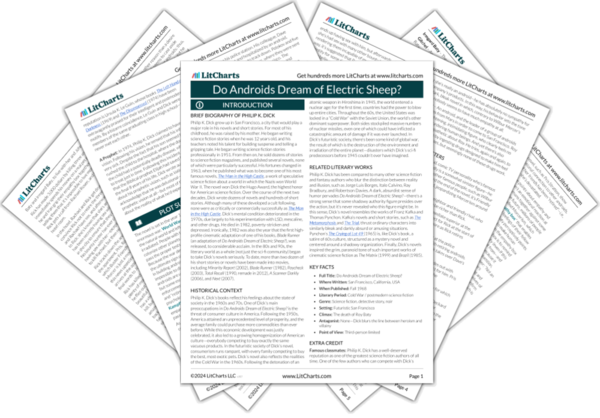Summary
Analysis
Rick Deckard stops at a pet shop on his way to work. This is a common way to kill time in San Francisco—the pet shop contains hundreds of exotic animals, most of which (ostriches, for example) are very rare.
In the future, life is centered around animals. Basic supply and demand: because there are fewer animals, they automatically become more interesting and more valuable.
Themes
Rick arrives at his police station and greets his superior, Harry Bryant. Rick learns that his colleague, a man named Dave Holden, was shot and injured recently. Rick’s secretary, Ann Martsen, suggests that the killer was a Nexus-Six android, a robot designed by the Rosen Association. Rick thinks about the Nexus-Six model. On Earth, both the United States and the Soviet Union work together to fight Nexus-Six robots. But because the Rosen Association is based on Mars, not Earth, there’s almost no legal way to recall the Nexus-Six robots.
This is the setup for the plot of the novel. We could say that the plot itself is pretty standard stuff: there was an attempted murder; the detective has to track down the attacker, etc. (this is a noir novel, as well as a sci-fi novel). But Dick, as we’ve seen, isn’t just interested in the plot: he’s interested in establishing a mood and exploring big philosophical questions as well. The Rosen Association seems basically invincible, another shadowy corporation controlling the desires and emotions of the populace.
Themes
Rick continues thinking about the Nexus-Six model. One reason these robots are so dangerous is that it’s hard to “test” that they’re robots at all—for all intents and purposes, they’re human beings. However, there is one test, the Voigt-Kampff Empathy Test, that’s designed to root out Nexus-Sixes. Because these robots are designed for intelligence, their emotional capacities are very low. Rick’s job is to track down Nexus-Six robots and “retire”—i.e., kill—them (Rick finds it easier to perform his duties when he thinks of it as “retiring”).
Here Dick poses the great philosophical problem of the novel—how do we tell what is and isn’t human? What is human nature, and how can we measure it? For the time being, it seems that Dick has an answer in mind: empathy. The quintessential human emotion, according to Rick, is the ability to feel someone else’s pain and emotion. It’s very important to note that Rick feels comfortable with killing androids precisely because he believes in this definition of human nature—in other words, his belief in the importance of empathy allows him to suspend all empathy with regard to androids.
Themes
Empathy is the key to testing an android’s humanity, Rick thinks. There’s a strange religion called Mercerism, which requires its followers to unite in a sense of strong, overpowering empathy. Empathy, Rick believes, is the quintessential emotion of all non-carnivorous life forms—without empathy, species would have gone extinct long ago. Nexus-Six robots can’t feel empathy of any kind.
Empathy is enormously important in this fictional world. One reason this might be the case is that everyone seems so isolated and alienated from each other. Just as animals have become more valuable because there aren’t many of them left, empathy has become a precious commodity because it’s in short supply.
Themes
Get the entire Androids Dream LitChart as a printable PDF.

In Mercerism, Rick thinks, there’s a strong emphasis placed on opposing “killers,” and Mercer, the founder of Mercerism, opposes killing of any kind. His followers hate the notion of killing, too—thus, to call anyone a Killer is a terrible insult.
One paradox of Mercerism, a religion of empathy, is that it opposes killing, and yet its focus on empathy enables Rick and others to kill without feeling guilty—because androids aren’t empathetic, they aren’t truly alive, and thus aren’t truly being killed.
Themes
Rick takes a pinch of Siddons snuff (an unexplained drug) and thinks about the pet shop he visited. He calls the store and inquires about down payments on ostriches. The salesman asks Rick if he’d be willing to trade anything for the ostrich, such as a car. Rick says he might be, and gives a fake name to the salesman. Then, he dials the number of the false-animal shop where he got his fake sheep. He learns that a fake ostrich costs 800 dollars. Rick prepares to study Nexus-Six robots. He considers the fact that his injured colleague, Dave Holden, now can’t work anymore, so Rick will have more work to do “retiring” androids.
Rick takes drugs constantly during the course of this novel—it’s hard, as a result, to tell what parts of his experiences are really happening and which parts are just delusions. And yet even if he’s hallucinating, Rick still immediately thinks of buying an animal to better “fit in” to his society and impress others. In other words, in a society where the idea of reality is vague and seemingly under attack, the only “true” experiences are crassly corporate, mediated by the exchange of money for a good or service.
Themes












